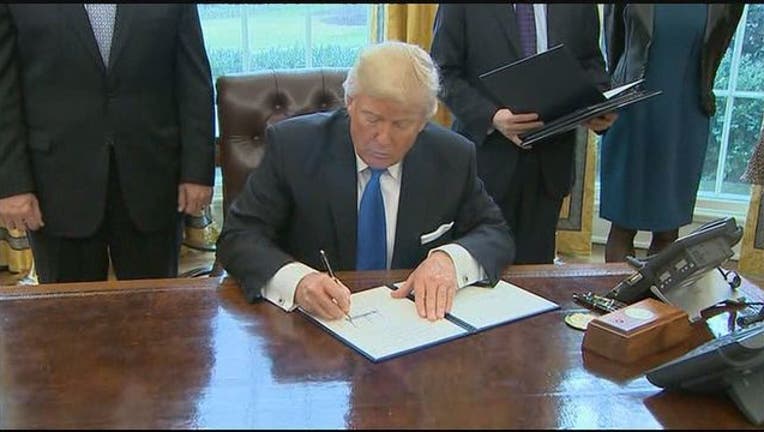U.S. appeals court hears arguments on revised travel ban

President Donald Trump
By Bay City News Service
Lawyers for the U.S. Justice Department and the state of Hawaii argued before a federal appeals court today about whether the panel should consider President Trump's campaign comments when deciding on the
constitutionality of his revised travel ban.
A three-judge panel of the 9th U.S. Circuit Court of Appeals heard the arguments in Seattle and will rule later on the government's appeal of a preliminary injunction by a federal judge in Hawaii that blocked the ban.
The San Francisco-based circuit court, which has jurisdiction over nine western states, streamed the arguments live on its website.
The executive order issued by Trump on March 6 would suspend entry by visitors from six predominantly Muslim countries for three months and by all refugees for four months while the government reviews its vetting
procedures.
Hawaii claims it is unconstitutional because it targets Muslims on the basis of their religion. It alleges the bias is proved by campaign statements such as Trump's promise to call for "a total and complete shutdown
of Muslims entering the United States."
Acting U.S. Solicitor General Jeffrey Wall told the court that Trump's campaign statements were irrelevant because he later clarified as president that he was aiming at terrorist groups. He said the order has
neutral wording and does not mention religion.
"What he's talking about are terrorist groups, not all Muslims." Wall argued.
"No one has ever tried to set aside a law that's neutral on its face and neutral in its operation on the basis of campaign statements made by a private citizen running for office," he contended.
Judge Michael Hawkins asked, "Did the president ever disavow his campaign remarks?"
Wall responded, "Over time, the president clarified that what he was talking about was Islamic terrorist groups in countries that have sheltered or sponsored them."
But Neal Katyal, a lawyer for Hawaii, argued, "The truth is there is no such disavowal, both pre- and post-campaign."
He noted that Trump's promise of a total shutdown on Muslims remained on his campaign website up until last week.
"This is a very limited, very unusual case when you have the public statements by the president. The history is overwhelming," he said.
The panel took the case under submission after hearing more than an hour of arguments. It has no deadline for issuing its written decision, but has announced it is handling the case on an expedited basis.
The 9th Circuit is one of two federal appeals courts considering challenges to the executive order. The other is the 4th Circuit, based in Richmond, Va., which heard arguments May 8 on the government's appeal of a preliminary injunction by a federal judge in Maryland that blocked part of the executive order.
That injunction applied to the ban on entry by visitors from the six countries and not to the suspension of entry by refugees.
To reinstate the full executive order, the Trump administration would have to win its appeal in both circuit courts, or win a future appeal to the U.S. Supreme Court.
The revised executive order applies to visitors from Iran, Libya, Somalia, Sudan, Syria and Yemen.
Trump's original executive order also included Iraq and applied to visa holders and permanent U.S. residents as well as other visitors from those countries.
That order was halted by a federal judge in Seattle. A different panel of the 9th Circuit upheld the lower court decision on Feb. 9, saying that the ban violated due process rights.
One week later, the Justice Department told the court that the Trump administration would revise the ban rather than continue to appeal the Seattle judge's injunction.

